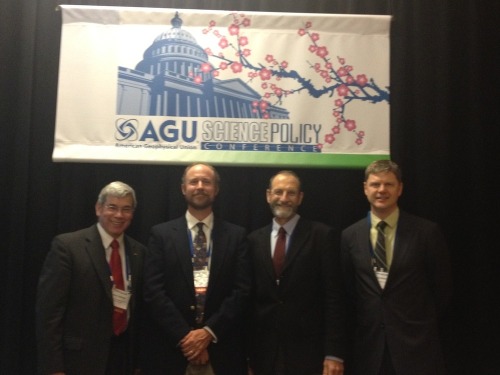by Jack Hedin, of Featherstone Farm
This blog was cross-posted with permission from Featherstone Farm
Pictured L to R: Jerry Hatfield (Director of USDA-ARS National Laboratory for Agriculture and the Environment in Ames, Iowa). Jack Hedin. Christopher Field (Stanford University, the Carnegie Institution for Science; Co-Chair of Working Group II of the Intergovernmental Panel on Climate Change). Michael Roberts (Agricultural Economist at North Carolina State). Not pictured: Gary Pierzynski (Kansas State University; President, Soil Science Society of America).
Those of you who have been members of Featherstone Farm for many years know that I like to think and write about issues of land use, sustainability and public policy. I’ve always thought it’s important to understand what we do on the farm in the context of the “big picture” of agriculture, human communities and the environment.
Last week I had a unique opportunity to take part in a discussion of this sort at a very high level. I was invited to Washington, DC for a conference on Science Policy hosted by the American Geophysical Union (http://sites.agu.org/spconference/). On Tuesday afternoon I was on a panel discussion entitled “Food Security and Climate Change,” along with 3 pre-eminent scientists who have spent entire careers researching the issues. Boy, did I feel in “over my head” at some level!
Unfortunately the session was not video taped; had it been, I would have gone back through the other presenters’ talks many times over by now. In essence, the messages I took away from their presentations, are: a) that climate change is upon us, and that our policy and research efforts should turn immediately to mitigating effects (in essence, it’s too late for prevention), and b) that even under the most optimistic scenarios for the upper Midwest, the next century will see hotter, drier weather during the growing season, with more erratic, severe storms, even as winters and springs will be wetter and c) that this will almost certainly mean that grain productivity (= global food security) will be negatively impacted.
How negatively? The presenters did not speculate. These are serious academic researchers, and it is not in their DNA to be running around crying “the sky is falling.” And this is in part what makes their message so chilling; it’s clear that these folks have little to gain from inflating their conclusions. They are scientists, not advocates. And if even half of what they’re suggesting is statistically likely is accurate, our grandchildren and the world they inhabit are in for a rough ride, to be sure.
My own (small!) contribution to this discussion, was a ground level view of the effects of climate change on Featherstone Farm. I spoke about phenological variation I’ve seen in 16+ years of farming here in SE Minnesota (ie broccoli still growing later and later into the fall, spinach and garlic starting earlier and earlier in the spring). I spoke about how fewer “fieldwork days” every spring due to surplus moisture, effects the sustainability of our farm (as, for example, this week, when we’re sitting idle waiting for fields to dry out, with acres and acres of transplants (over)maturing in the greenhouse). Most of all, I spoke about the flood of 2007, one of three “1000 year rain events” we’ve experienced in southern Minnesota since 2004.
As sobering as this panel discussion was, I came away from it newly energized and committed to continuing the day-to-day work of sustainability at Featherstone Farm. Because in “the big picture”, I do believe that we’re on the right track, with our soil building crop rotation, our renewable energy focus, and our local/regional community building. As one fellow Minnesotan said, it may be “a hard rain’s ‘a gonna’ fall,” but I think we’re preparing for it, and doing what we can to lessen its effects, in all we do at Featherstone Farm.
As always, thanks for your interest and support for our efforts. Together we can create the more sustainable world we all want, and need!
– Jack Hedin



How great that the AGU invited you to be on this panel. Thank you for sharing your farming experiences with them — and your experiences being on the panel with us here. Some people call themselves "citizen scientists" you’re creating a new category "farmer-citizen-scientist" Thanks! the world need more folks like you!
LikeLike